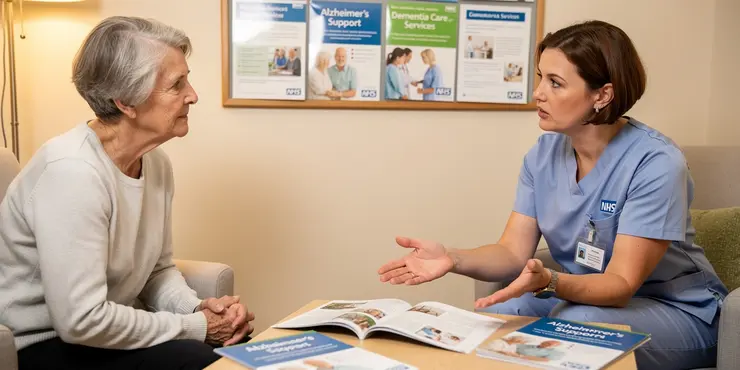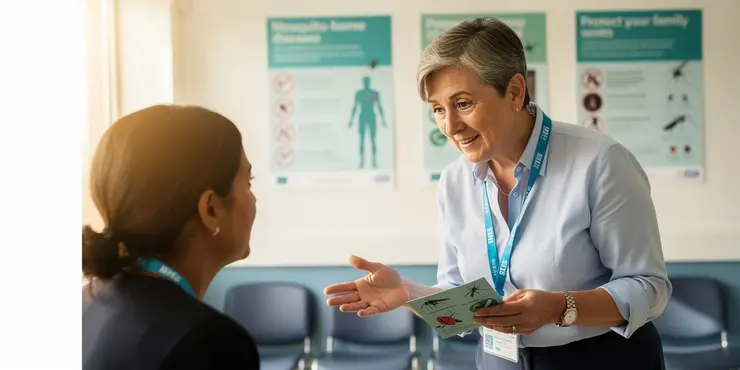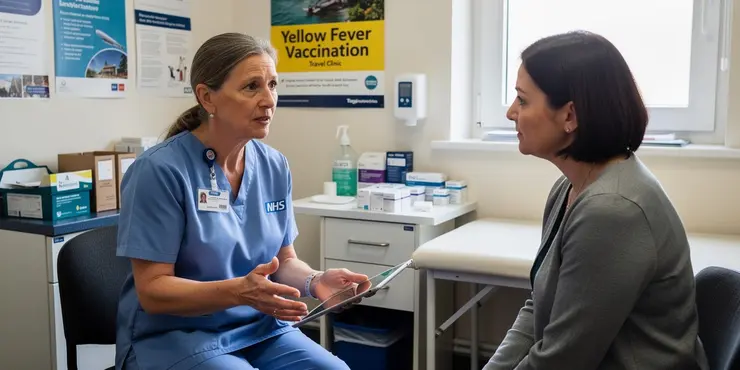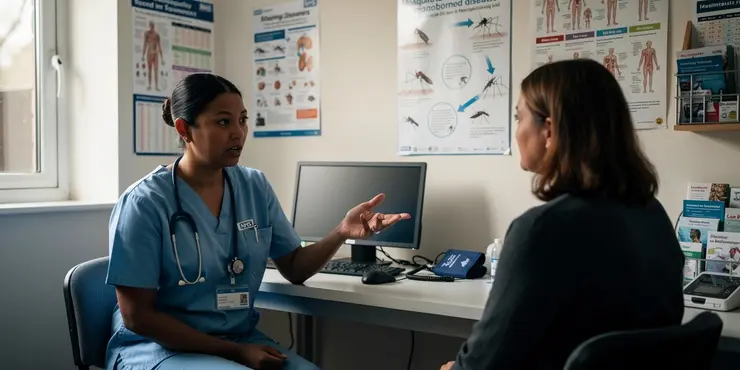
Find Help
More Items From Ergsy search
-

How common is Alzheimer's disease in the UK?
Relevance: 100%
-

What is Alzheimer's disease?
Relevance: 92%
-

What treatments are available for Alzheimer's disease?
Relevance: 84%
-

What are the stages of Alzheimer's disease?
Relevance: 84%
-

What causes Alzheimer's disease?
Relevance: 84%
-

How is Alzheimer's disease diagnosed?
Relevance: 84%
-

Who is at risk of developing Alzheimer's disease?
Relevance: 83%
-

Can Alzheimer's disease be prevented?
Relevance: 83%
-

What are the symptoms of Alzheimer's disease?
Relevance: 82%
-

What role does genetics play in Alzheimer's disease?
Relevance: 79%
-

Where can I find information about Alzheimer's disease for carers?
Relevance: 73%
-

How can carers plan for future stages of Alzheimer's disease?
Relevance: 72%
-

How does Alzheimer's affect daily life?
Relevance: 66%
-

Can technology aid in the care of Alzheimer's patients?
Relevance: 60%
-

What support is available for carers of Alzheimer's patients?
Relevance: 58%
-

How can families support a loved one with Alzheimer's?
Relevance: 57%
-

What online communities exist for carers of people with Alzheimer's?
Relevance: 55%
-

What transportation services are available for Alzheimer's patients and their carers?
Relevance: 54%
-

Are there any lifestyle changes that can help reduce the risk of Alzheimer's?
Relevance: 54%
-

What types of support are available for carers of Alzheimer's patients?
Relevance: 54%
-

How important is self-care for carers of Alzheimer's patients?
Relevance: 53%
-

Are there specific apps or tools to help carers of Alzheimer's patients?
Relevance: 53%
-

Are there financial support programs for carers of Alzheimer's patients?
Relevance: 52%
-

What emotional support is available for carers of Alzheimer's patients?
Relevance: 52%
-

Can carers of Alzheimer's patients access in-home healthcare services?
Relevance: 51%
-

How can support groups benefit carers of Alzheimer's patients?
Relevance: 51%
-

What government assistance is available for carers of Alzheimer's patients?
Relevance: 50%
-

What legal resources are available for carers of Alzheimer's patients?
Relevance: 48%
-

Do UK mosquitoes carry diseases?
Relevance: 47%
-

Do spiders in the UK carry diseases?
Relevance: 47%
-

What diseases are spread by mosquitos in the UK in 2025?
Relevance: 45%
-
Do all mosquitoes in the UK carry diseases?
Relevance: 45%
-

Are there any new mosquito-borne diseases emerging in the UK in 2025?
Relevance: 44%
-

What research is being conducted on mosquito-borne diseases in the UK?
Relevance: 44%
-

Is there a season when mosquito-borne diseases are more likely in the UK?
Relevance: 44%
-
Can mosquitoes transmit any bacterial diseases in the UK?
Relevance: 43%
-

What support is available for people with Crohn's disease in the UK?
Relevance: 43%
-

Are any vaccines available in the UK for mosquito-borne diseases?
Relevance: 43%
-

What regions of the UK are most affected by mosquito-borne diseases?
Relevance: 43%
-

What is the finger prick blood test for Alzheimers?
Relevance: 42%
How Common is Alzheimer's Disease in the UK?
Introduction to Alzheimer's Disease
Alzheimer's disease is the most prevalent form of dementia, a term used to describe disorders that affect the brain's cognitive functions. It primarily impacts memory, thought, language, and the ability to carry out simple tasks. Alzheimer's disease is progressive, meaning symptoms gradually worsen over time. As of recent studies, Alzheimer's constitutes a significant proportion of dementia diagnoses in the United Kingdom.
Prevalence of Alzheimer's in the UK
In the UK, Alzheimer's disease is a major public health issue. There are currently around 900,000 people living with dementia in the United Kingdom, and Alzheimer's accounts for between 60% and 80% of all cases. This means that hundreds of thousands of individuals across the nation are grappling with this condition, affecting not only the individuals themselves but also their families and carers.
Impact of an Aging Population
The prevalence of Alzheimer's is closely tied to age, with older populations being more susceptible to developing the disease. As the UK population continues to age, with projections suggesting that the number of people over 85 will double in the next two decades, the incidence of Alzheimer's is expected to rise. This demographic trend underscores the pressing need for effective treatments and support systems to manage the growing impact of this disease.
Efforts to Address Alzheimer's Disease
In response to the increasing prevalence, public health initiatives and medical research in the UK are prioritizing Alzheimer's. The government and various organizations, such as the Alzheimer’s Society, are dedicated to raising awareness, improving care, and supporting ongoing research. Campaigns focus on improving public understanding of the disease and offering help to those affected. Efforts also include significant investments in research to find preventive strategies, treatments, and potentially a cure in the future.
Conclusion
Alzheimer's disease remains a significant challenge for the UK, with a substantial number of individuals affected. With projections indicating an increase in cases due to an aging population, addressing this challenge is becoming increasingly urgent. Through awareness, improved care infrastructure, and focused research efforts, there is hope to better manage and eventually reduce the impact of Alzheimer's on the UK population.
How Common is Alzheimer's Disease in the UK?
Introduction to Alzheimer's Disease
Alzheimer's disease is a type of brain illness. It is the most common form of dementia. Dementia is when the brain does not work as it should. Alzheimer's makes it hard to remember things, think clearly, talk, and do simple tasks. It gets worse over time. Many people in the UK who have dementia have Alzheimer's disease.
Prevalence of Alzheimer's in the UK
Alzheimer's disease is a big health issue in the UK. About 900,000 people in the UK have dementia. Of these, 60% to 80% have Alzheimer's disease. This means many people, and their families, are affected by it.
Impact of an Aging Population
Older people are more likely to get Alzheimer's. The UK has more older people now, and the number of people over 85 will double in 20 years. This means more people might get Alzheimer's. We need better treatments and support for them.
Efforts to Address Alzheimer's Disease
To help with Alzheimer's, many groups in the UK are working hard. The government and organizations like the Alzheimer's Society are trying to improve care and tell people about the disease. They do research to find better treatments and maybe a cure. They also run campaigns to help people understand Alzheimer's better.
Conclusion
Alzheimer's disease is a big challenge in the UK. Many people are affected, and more will be as the population gets older. Raising awareness and improving care and research are key to dealing with Alzheimer's. There is hope for better management and possibly reducing the impact of Alzheimer's in the future.
Frequently Asked Questions
What is Alzheimer's disease?
Alzheimer's disease is a progressive neurological disorder that causes brain cells to waste away and die, leading to memory loss, cognitive decline, and personality changes.
How common is Alzheimer's disease in the UK?
Alzheimer's disease is the most common type of dementia in the UK, affecting around 850,000 people, which is approximately 1 in 14 people over the age of 65.
At what age is Alzheimer's disease most commonly diagnosed?
Alzheimer's disease is most commonly diagnosed in people over the age of 65, but it can also occur in younger individuals, known as early-onset Alzheimer's.
What are the early symptoms of Alzheimer's disease?
Early symptoms of Alzheimer's disease include memory lapses, difficulty in finding words, problems with daily tasks, and changes in mood or behavior.
How is Alzheimer's disease diagnosed?
Diagnosis typically involves a combination of medical history evaluation, physical and neurological exams, mental status tests, and sometimes brain imaging.
What risk factors are associated with Alzheimer's disease?
Risk factors include age, family history, genetics, cardiovascular health, and lifestyle factors such as smoking and lack of physical activity.
Is there a cure for Alzheimer's disease?
There is currently no cure for Alzheimer's disease, but there are treatments available that can help manage symptoms and improve quality of life.
What treatments are available for Alzheimer's disease?
Treatments include medications to help manage symptoms, as well as support services and lifestyle changes to improve quality of life.
Can lifestyle changes help with Alzheimer's disease prevention?
Yes, maintaining a healthy lifestyle with regular physical activity, a balanced diet, mental stimulation, and social engagement may help reduce the risk of Alzheimer's disease.
What support is available for people with Alzheimer's disease in the UK?
Various support services are available, including those offered by the NHS, Alzheimer's Society, and local support groups and charities.
How does Alzheimer's disease progress over time?
Alzheimer's disease typically progresses from mild to moderate to severe stages, with symptoms worsening over time and eventually leading to the need for full-time care.
Can Alzheimer's disease affect young people?
While less common, Alzheimer's disease can affect people under the age of 65, which is known as early-onset Alzheimer's disease.
How can I support a family member with Alzheimer's disease?
Providing emotional support, assisting with daily tasks, ensuring a safe environment, and seeking professional help can be beneficial for a family member with Alzheimer's.
Are there ongoing research and advancements in Alzheimer's treatment?
Yes, ongoing research is being conducted worldwide to find better treatment options, understand the disease better, and work towards a potential cure.
How does Alzheimer's disease impact families and caregivers?
Alzheimer's can have significant emotional, physical, and financial impacts on families and caregivers due to the increasing care needs as the disease progresses.
What is Alzheimer's disease?
Alzheimer's disease is an illness that affects the brain. It makes it hard for people to remember things and think clearly. It can happen to older people. This illness can change their mood and how they act.
Here are some tips to help:
- Use pictures to remember important things. This can help you keep track of what you need to do.
- Write down things you want to remember, like names and places.
- Ask someone you trust for help if you are confused.
- Take your time to do things slowly. This can make it easier to think.
Alzheimer's disease is a sickness that affects the brain. It gets worse over time. It makes brain cells stop working and die. This causes people to forget things, have trouble thinking, and sometimes act differently.
How many people have Alzheimer's disease in the UK?
Alzheimer's disease is a sickness of the brain. It makes it hard for people to remember things and think clearly.
In the UK, many people have Alzheimer's disease. About 1 in every 6 people aged over 80 have it. This means it is common in older people.
It is important to talk to doctors if you or someone you know has trouble remembering.
Here are some things that can help:
- Keeping a diary or notebook to write things down.
- Using a calendar to remember important dates.
- Asking family or friends for help when needed.
Alzheimer's disease is a sickness that makes it hard to remember things. It is the most common type of this problem in the UK. Around 850,000 people have it. That means about 1 out of every 14 people older than 65 has this disease.
How old are most people when they find out they have Alzheimer's disease?
Alzheimer's disease usually happens to people who are older than 65. But sometimes, younger people can get it too. This is called early-onset Alzheimer's.
What are the early signs of Alzheimer's?
Alzheimer's is a sickness that makes it hard to remember things.
Here are some early signs:
- Forgetting things that just happened.
- Having trouble with everyday tasks.
- Getting confused about places or times.
- Finding it hard to talk or write.
- Losing things often, like keys or wallets.
If you notice these signs, talk to a doctor. They can help.
Here are some tips to help:
- Keep notes to remember things.
- Use reminders on a phone or watch.
- Ask friends and family for help.
Early signs of Alzheimer's disease are forgetting things, trouble finding the right words, having problems with everyday tasks, and changing moods or behavior.
If you have trouble reading, try using tools like audiobooks or apps that read out loud. It can also help to read with a friend or use a dictionary for words you don't know. Take your time and remember to ask for help if you need it.
How do doctors find out if someone has Alzheimer's disease?
Doctors use different tests to see if a person has Alzheimer's disease. They may:
- Ask questions about the person's health and memory.
- Talk to family members about changes they see.
- Do tests on the person’s memory, like simple questions or puzzles.
- Take pictures of the brain using special machines, like an MRI.
- Check blood or take other samples to rule out other problems.
It can be helpful to bring a friend or family member to the doctor's visit to help remember important information. Writing down symptoms and questions before the visit can also be useful.
The doctor will find out what is wrong by doing a few things. They will talk to you about your health in the past. They will look at your body and how your brain works. Sometimes they will ask questions to see how you think and remember things. They might also take pictures of your brain.
What can increase the chances of getting Alzheimer's disease?
Things that can make your health worse are:
- How old you are
- If people in your family have had the same problems
- Your genes (what you get from your parents)
- Heart health
- How you live, like if you smoke or don’t exercise
To help stay healthy, you can:
- Stay active, like playing outside or walking
- Eat fruits and vegetables
- Not smoke
Can Alzheimer's disease be fixed?
Right now, there is no cure for Alzheimer's disease. This means doctors cannot make it go away completely.
Doctors and scientists are working hard to find a way to help people with Alzheimer's. There are some medicines that can help with the symptoms, like memory loss, but they do not fix the disease.
If you or someone you know has Alzheimer's, here are some things that can help:
- Ask a doctor for advice.
- Use reminders like notes or alarms.
- Keep a routine to make the day easier.
- Talk to friends or family for support.
Remember, it’s okay to ask for help and support when you need it.
There is no cure for Alzheimer's disease right now. But, there are treatments that can help with symptoms and make life better.
What can help people with Alzheimer's disease?
Alzheimer's disease is a sickness that affects how the brain works. People with this disease can get forgetful and confused. There are some ways to help them feel better.
Medicines can help to make the sickness slow down. They won't cure it, but they can help with memory and thinking.
Doctors and nurses can give advice and check what medicines might help.
Activities can be good for the brain. Things like puzzles, drawing, or music can help people stay busy and happy.
Sometimes, people with Alzheimer's might feel sad or worried. Talking to a friendly person can help.
Families can help by being patient and giving support. It's important to be kind and understand.
There are also groups where families can learn and get help from others who understand Alzheimer's.
Using pictures, charts, and reminders can help people remember things better.
These are just some ideas that might help people with Alzheimer's feel better.
Treatments can include medicines to help with symptoms. There are also support services and changes you can make in your daily life to feel better.
Can changing how we live help stop Alzheimer's disease?
Alzheimer's is a sickness that makes it hard to remember things. Can changing the way we live help stop it? Let's look at some things we can do to stay healthy:
- Eat Healthy Foods: Eating fruits, vegetables, and whole grains is good for our brains.
- Exercise: Moving our bodies, like walking or playing, helps keep our brains strong.
- Sleep Well: Getting enough sleep helps our brains rest and stay sharp.
- Learn New Things: Doing puzzles or reading keeps our brains busy and healthy.
- Spend Time with Friends: Talking and playing with others helps our brains feel good.
These are simple things we can do every day. They help us take care of our brains. If you need help with these, ask a grown-up. Remember, small changes can make a big difference!
Yes, living in a healthy way can help you lower the chance of getting Alzheimer's disease. This means moving your body regularly, eating different kinds of healthy food, keeping your mind active, and spending time with other people.
What help can people with Alzheimer's get in the UK?
People with Alzheimer's in the UK can get help from different places.
Here are some ways to get help:
- Doctors and Nurses: They can give medicine and advice.
- Support Groups: People can talk and share experiences.
- Charities: Groups like Alzheimer's Society can provide information.
- Care at Home: Helpers can come to the house and assist with daily tasks.
- Day Centres: Places where people with Alzheimer's can be with others during the day.
Using simple tools can also help, like...
- Pill Organizers: To remember to take medicine.
- Calendars: To keep track of important dates.
- Reminder Apps: Apps on phones that remind you what to do.
If you need help, ask your doctor or a friend to find out more.
There are many ways to get help. You can find support from the NHS, the Alzheimer's Society, and local groups and charities.
What happens to people with Alzheimer's over time?
Alzheimer's is an illness that affects the brain. It gets worse slowly. Here is how it changes: 1. **Early Signs:** - People forget things. - They find it hard to remember new information. - They might lose things often. 2. **Middle Stages:** - Forgetting gets worse. - They might get confused about where they are. - They may need help with some daily tasks, like cooking or paying bills. 3. **Late Stages:** - They may not remember family and friends. - They need help with almost everything, like eating and dressing. - They may have trouble speaking. **Support Tips:** - Use a calendar to remember dates. - Label things at home to help find them. - Make daily routines and stick to them. It is important to be kind and patient with people who have Alzheimer's.Alzheimer's disease gets worse over time. It starts with mild problems, then medium problems, and finally gets very bad. People with Alzheimer's need more and more help as time goes on. At the end, they need someone to help them all the time.
Here are some things that can help: - Use simple words and short sentences. - Break information into small steps. - Use pictures and charts if you can. - Repeat important information. - Ask someone to help you understand.Can young people get Alzheimer's disease?
Alzheimer's disease usually affects older people. But sometimes, younger people can get it too. This is called "early-onset Alzheimer's." It is not common.
Doctors and scientists try to find out why this happens. If you or someone you know is worried, talk to a doctor. They can help explain things.
Some ways to support learning about Alzheimer's:
- Use simple words when talking about it.
- Look at pictures or videos that explain what it is.
- Ask questions if you do not understand.
Sometimes, people younger than 65 years old can get a disease called Alzheimer's. This is called early-onset Alzheimer's.
How can I help a family member with Alzheimer's disease?
Alzheimer's disease is a sickness that makes it hard for people to remember things. If a family member has Alzheimer's, you can help them in different ways:
- Be Patient: Stay calm and give them time to speak and do things.
- Talk Clearly: Use simple words and short sentences. Speak slowly.
- Help with Daily Tasks: Assist them in getting dressed or eating when they need it.
- Stick to a Routine: Try to do the same things at the same times every day. This helps them know what to expect.
- Use Pictures: Show them pictures to help them understand and remember.
- Stay Positive: Smile and use kind words to make them feel loved and safe.
If you need more help, ask a doctor or a support group. They can give advice and support to you and your family member.
Helping a family member with Alzheimer's can be done in a few simple ways:
- Be supportive: Show them love and care. Listen when they talk.
- Help with daily tasks: Offer to help with things like cooking, cleaning, or getting dressed.
- Keep them safe: Make sure their home is a safe place to be.
- Ask for help: Talk to a doctor or nurse about ways to help them feel better.
Is new work being done to help people with Alzheimer's?
Scientists are working to find new ways to help people with Alzheimer's disease. They want to make medicines and treatments better.
If you have questions or need help, you can:
- Talk to a doctor.
- Ask a nurse.
- Use pictures or videos to learn more.
- Ask a family member or a friend to help explain.
Yes, people all over the world are trying to learn more about the disease. They want to find better ways to help people who are sick and maybe even cure the disease one day.
How does Alzheimer's disease affect families and caregivers?
Alzheimer's disease changes how a person thinks and acts. This can make things hard for families and people who take care of them.
Here are some ways Alzheimer's disease can affect families and caregivers:
- The person with Alzheimer's might forget things or get confused. This can be upsetting for everyone.
- Caregivers may feel tired or stressed because taking care of someone with Alzheimer's can be a lot of work.
- It can cost money to take care of someone with Alzheimer's. Families might need to find ways to pay for extra help.
- Sometimes, families may need to learn new ways to talk and spend time with their loved one.
Here are some ways to get help:
- Join a support group to talk with other people who understand what you are going through.
- Ask friends and family for help when you need it.
- Learn more about Alzheimer's disease so you know what to expect.
Alzheimer's is a sickness that can change someone's brain. It makes people forget things and need more help as time goes on.
This can be hard for families who love and care for them. It can make people feel sad, tired, and worried about money.
If you know someone with Alzheimer's, it can help to talk to others about how you feel. Try to be patient and take breaks when you need them. There are many groups and people who can help and give advice.
Useful Links
This website offers general information and is not a substitute for professional advice.
Always seek guidance from qualified professionals.
If you have any medical concerns or need urgent help, contact a healthcare professional or emergency services immediately.
Some of this content was generated with AI assistance. We’ve done our best to keep it accurate, helpful, and human-friendly.
- Ergsy carfully checks the information in the videos we provide here.
- Videos shown by Youtube after a video has completed, have NOT been reviewed by ERGSY.
- To view, click the arrow in centre of video.
- Most of the videos you find here will have subtitles and/or closed captions available.
- You may need to turn these on, and choose your preferred language.
- Go to the video you'd like to watch.
- If closed captions (CC) are available, settings will be visible on the bottom right of the video player.
- To turn on Captions, click settings .
- To turn off Captions, click settings again.
More Items From Ergsy search
-

How common is Alzheimer's disease in the UK?
Relevance: 100%
-

What is Alzheimer's disease?
Relevance: 92%
-

What treatments are available for Alzheimer's disease?
Relevance: 84%
-

What are the stages of Alzheimer's disease?
Relevance: 84%
-

What causes Alzheimer's disease?
Relevance: 84%
-

How is Alzheimer's disease diagnosed?
Relevance: 84%
-

Who is at risk of developing Alzheimer's disease?
Relevance: 83%
-

Can Alzheimer's disease be prevented?
Relevance: 83%
-

What are the symptoms of Alzheimer's disease?
Relevance: 82%
-

What role does genetics play in Alzheimer's disease?
Relevance: 79%
-

Where can I find information about Alzheimer's disease for carers?
Relevance: 73%
-

How can carers plan for future stages of Alzheimer's disease?
Relevance: 72%
-

How does Alzheimer's affect daily life?
Relevance: 66%
-

Can technology aid in the care of Alzheimer's patients?
Relevance: 60%
-

What support is available for carers of Alzheimer's patients?
Relevance: 58%
-

How can families support a loved one with Alzheimer's?
Relevance: 57%
-

What online communities exist for carers of people with Alzheimer's?
Relevance: 55%
-

What transportation services are available for Alzheimer's patients and their carers?
Relevance: 54%
-

Are there any lifestyle changes that can help reduce the risk of Alzheimer's?
Relevance: 54%
-

What types of support are available for carers of Alzheimer's patients?
Relevance: 54%
-

How important is self-care for carers of Alzheimer's patients?
Relevance: 53%
-

Are there specific apps or tools to help carers of Alzheimer's patients?
Relevance: 53%
-

Are there financial support programs for carers of Alzheimer's patients?
Relevance: 52%
-

What emotional support is available for carers of Alzheimer's patients?
Relevance: 52%
-

Can carers of Alzheimer's patients access in-home healthcare services?
Relevance: 51%
-

How can support groups benefit carers of Alzheimer's patients?
Relevance: 51%
-

What government assistance is available for carers of Alzheimer's patients?
Relevance: 50%
-

What legal resources are available for carers of Alzheimer's patients?
Relevance: 48%
-

Do UK mosquitoes carry diseases?
Relevance: 47%
-

Do spiders in the UK carry diseases?
Relevance: 47%
-

What diseases are spread by mosquitos in the UK in 2025?
Relevance: 45%
-
Do all mosquitoes in the UK carry diseases?
Relevance: 45%
-

Are there any new mosquito-borne diseases emerging in the UK in 2025?
Relevance: 44%
-

What research is being conducted on mosquito-borne diseases in the UK?
Relevance: 44%
-

Is there a season when mosquito-borne diseases are more likely in the UK?
Relevance: 44%
-
Can mosquitoes transmit any bacterial diseases in the UK?
Relevance: 43%
-

What support is available for people with Crohn's disease in the UK?
Relevance: 43%
-

Are any vaccines available in the UK for mosquito-borne diseases?
Relevance: 43%
-

What regions of the UK are most affected by mosquito-borne diseases?
Relevance: 43%
-

What is the finger prick blood test for Alzheimers?
Relevance: 42%


